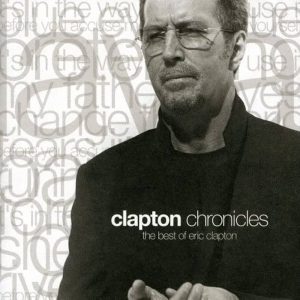
Published on Oct 27, 1999
I would love to hear the argument of someone who doesn’t believe
that Eric Clapton is overdue for a “greatest hits” collection —
or, more correctly, a collection of his hits since he’s been with
Reprise. After all, it’s only been in this time that Clapton
revitalized his career (though, if he had it back, I’m sure he
would rather have had the son he lost than a song written about his
grief) and raised him to the level of elder statesman in his
field.
Clapton Chronicles, a 14-song collection of those hits since
1981, does an admirable job of tracking Clapton’s career, but it
has three small flaws: one a sin of omission, one a sin of
inclusion, and one mortal sin in music. More on these as we go
along.
There are two songs that absolutely shape this disc, simply
because they’re the songs that have shaped Clapton’s career in
recent years. The first is “Tears In Heaven,” a song written to
mourn the loss of his son Conor, who died in an accidental fall.
Anyone who is not moved by this song, even after severe overplay on
the radio, has to have ice water in their veins. (Wisely, whoever
compiled this disc chose to use the original version, which I think
has more punch than the
Unplugged rendition.)
The second is the version of “Layla” from
Unplugged; this song re-introduced a classic to a whole new
audience, and helped to bring new life to a track that is arguably
one of the best songs in rock & roll. This song deserves to be
held in high regard, as does the version featured on
Clapton Chronicles.
What makes this disc so spectacular is that it’s as comfortable
as an old pair of slippers; you put this disc in the CD player, and
it’s like you’re listening to classic rock radio. From the way
Clapton danced on the strings on songs like “Bad Love,” “Forever
Man” and “Pretending” (though I’ll admit in recent years I haven’t
liked the way the chords resolved in “Pretending”‘s chorus) to the
modern attack Clapton has shown towards songwriting on “My Father’s
Eyes” and the new track “Blue Eyes Blue”, Clapton shows often why
some people declared him to be God early in his career.
All of this said, you still can’t overlook the three sins.
First, the sin of omission: Where is “I’ve Got A Rock & Roll
Heart”? This might not have been a track to light the speakers on
fire, but it showcased “Slowhand” in a song that helped keep him in
the public eye for a while. I happen to have always liked this
song, and can’t help but wonder why it wasn’t included. Hell, while
we’re at it, why not put “Motherless Child” from Clapton’s blues
exercise
From The Cradle on this one? It’s just as deserving of a
track.
Next, the sin of inclusion: I would probably have pulled either
“Running On Faith” or the studio version of “Before You Accuse Me,”
and replaced them with one of the previously mentioned omitted
tracks. These are not bad songs by any means, but they’re not the
first ones I think of when I put the words “Eric Clapton” and
“greatest hits” together.
Finally, there is the mortal sin: Thou shall not try to be
hipper than one really is. Exhibit “A”: “(I) Get Lost,” a track
that proves once and for all that Clapton does not work well with a
hip-hop rhythm section. Let’s hope he got this out of his system
once and for all.
Still,
Clapton Chronicles is a wonderful collection that reminds
people just how important Clapton has been to the music scene over
the last 15 or so years, and is a fitting, though slightly flawed,
disc that captures one of the best in the industry at his
finest.